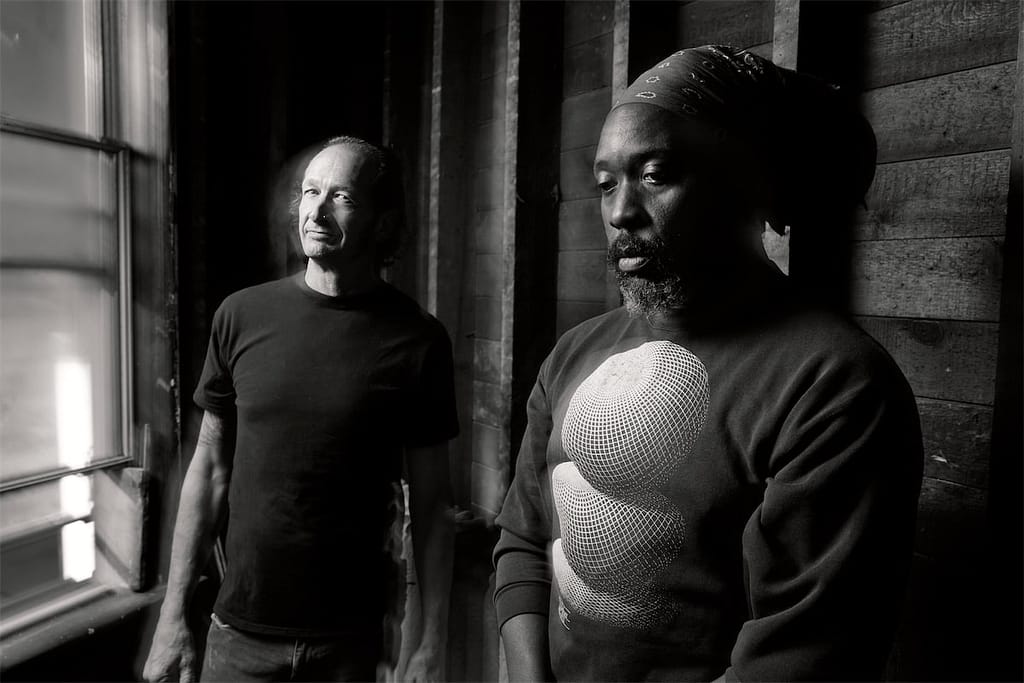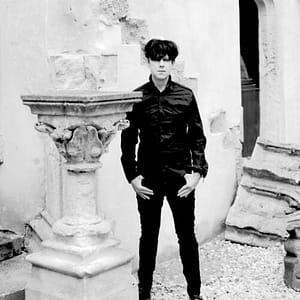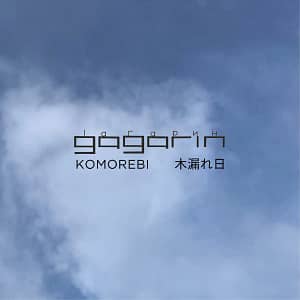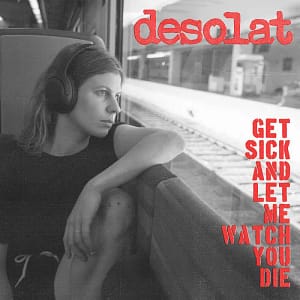Die Kreuzen (historically formed by Dan Kubinski (vocals), Brian Egeness (guitar), Keith Brammer (bass), and Eric Tunison (drums)) is a band originally from Rockford Illinois who moved then to Milwaukee. Your sound consisted of obscure, raw punk sound, whereas post-punk tonalities had prevailed in it in the following years.
If they were considered as part of the American Indie rock wave, Die Keuzen feel or felt distant from that scene for their less vivid side (in contrast with Minutemen, for example) and a more lysergic and ethereal character, and it’s not a case they are considered ones of screamo movement forerunners.
Dan Kubinski, who is active as a vocalist yet, released a record with Dwain Flowers as Deadfinger, in which there appear acoustic sonorities, soft and energetic at the same time. In this interview Dan recounters his most recent and historical path, the distance from hardcore and indie rock although his bonds with many punk groups, whose songs figure in the self-titled Deadfinger album.
Can you talk about how your historical band Die Kreuzen was born, and how was that experience as indie rock musicians in the context of your local town, which was Milwaukee?
“Die Kreuzen being born would have to start back in Rockford IL, where I grew up. In high school I had a friend who was an awesome drummer, my drummer friend found this guitar player, not sure how he found him but the guy could really play. He knew Rush, Van Halen and other bands we all loved in high school. He also knew about the Sex Pistols and some other crazy new music that was happening. When I finally started a band, that was initially called the Spots but soon changed to The Stains we needed a new guitar player.
I asked my drummer friends guitar playing friend if he’d like to jam with us, he said sure. That guitar player was Brian Egeness. We had a few gigs, our first in Rockford at a church social in the park. The second gig was at a Catholic high school and the the third gig I remember playing in Downtown Rockford at a bar/pizza joint. That night our second guitarist (Louie) was so drunk we just turned his amp down, he never noticed.
We played a few gigs in Beloit WI after that at a biker bar where my high school friend “Toothpaste” (Don) was playing gigs with his band. Then we were asked to come up and play a gig in Milwaukee WI with some friends, also from Rockford, who had already relocated to Milwaukee. We played a great show at this new club called The Starship.
It would only be a few short weeks before my bandmates and I would also move to Milwaukee as well and start to get involved with the music scene there. When we moved to Milwaukee our drummer stayed behind in Rockford, so immediately a search was put into effect to find a new drummer. My new friend Mark would play a few rehearsals with us but he never had a drum kit of his own, so that was a problem.
The next drummer was an awesome drummer, Connie Ruiz from The Ama-Dots. We had a handful of great rehearsals with Connie and only one gig, I was really bummed when she bowed out, she had other plans. The next drummer we had was Vicki who had been drumming with Kevn Kinney and his band The Prosecutors.
Vicki was great and we played a few shows with her, I remember a really fun summer of gigs at the Starship and a few other local Milwaukee places. Later that fall Vicki would show up to a rehearsal with a cast on her lower leg. We had just a few short weeks to find somebody to sit in with us because we had been granted a big gig opening for this cool punk band from California, Black Flag. Our friend Keith, who was coming with us to gigs and helping out suggested that we ask his high school friend Erik if he was interested. As it turns out Erik was interested and he did the gig with us and then never left! We played that way for a while as The Stellas. We played the Milwaukee area and most importantly we played in Chicago at Obanians which was an eye opener for us. People liked us in Chicago! In Milwaukee people hated us and made fun of us. Even in the local news paper who wrote a story on the Milwaukee punk scene with the title: “Punk isn’t dead yet” with a picture of our band next to the article.
When people cheered, clapped and spoke to us after our set and told us how great it was to have another cool punk band around we were amazed and delighted, we wanted to play Chicago again and more importantly we wanted to play anywhere outside of Milwaukee. When it came time for a new bass player we enlisted our good friend Keith Brammer and we also wanted a clean start, so to speak.
A fresh starting point and we hated our band name, The Stellas. So we changed to to die kreuzen (which we thought looked cool and we thought it meant “the crosses”) and we made a very specific prioroty about rehearsing as much as possible and playing out of town shows was a very strong second priority.”
Can you recount the most important characters of Milwakee scene and what was the main difference with the hardcore movement and the rest of the other indie rock band like Black Flag, Hüsker Dü, Minutemen, Mission of Burma?
“Milwaukee didn’t really like us, at least the established bands thought we were stupid and that we were aping the Sex Pistols and other bands that had expired. After all it was said that “Punk was dead” and theres my picture next to that statement.
We were only doing what other teenagers were doing, writing and playing music that resembled that bands that we loved but we knew about other bands, Black Flag, Circle Jerks, the Effigies and more and more. There was one Milwaukee band of guys just a bit older than us, The Oil tasters who were cool to us. They were a great band and we kinda looked up to them. They weren’t a hardcore band but maybe a punk/new wave kind of thing, they actually defy categorization. So very very good though, great players, great songs that were super tight and they were all accomplished musicians. We wanted to be like that too.
We did a couple of shows together, Die Kreuzen set one up at a skate park here in Milwaukee and they played with us, right in the bowls, it was a great show! They set up the next one in Chicago at a big warehouse, it was a great gig and another eye opener for us, so many cool bands in Chicago and so many people that liked us! So getting to jam with the Oil Tasters was very cool. The other band that accepted us was The Prosecutors, Kevn Kinneys’ (Drvin N Cryin) first band. We played together a lot, especially at the Starship. I remember a lot of “Mad Dog Thursdays” where Mad Dog was especially cheap and it was free to get in, those were fun, crazy gigs.
We learned a lot playing those early gigs at The Starship. We learned from Kenny Baldwin The Starships proprietor, also a great musician in his drum playing. Kenny taught us how to do a proper soundcheck, he taught how to show up on time for said soundcheck. Most importantly he taught us how to be respectful of the club and the folks who run it and patronize it. In other words he tought us how to be polite, courteous and respectful both when we walk into another club and in general in the real world.
We took those powerful lessons and put them to work as we ventured out of town and playing gigs in Chicago, Madison and Minneapolis. Kenny was instrumental in so many aspects of our band that I think its easy to say and very true to say that if he hadn’t been around us we wouldn’t have done the things we did then and continue to do now. He gave us so many opportunities along with the life lessons.
We opened for Black Flag not once but twice, we also opened for The Effigies, The Zero Boys, Cheeta Chrome, The Alley Cats, T.S.O.L., The Circle Jerks, Bad Brains and Husker Du and so many others. All those gigs were very important in one way or another, mostly in establishing ourselves as a local force and for the lessons we learned from Kenny.”
The sound of Die Kreuzen was powerful and ethereal, playing with sonorities from thrash or post-punk but in an abstract way. In Demo 1982 we can observe a visceral energy beyond common territories, a sound more diversified, which betray free jazz or proto-punk (Velvet Underground and Stooges) poetics. Can I ask you what was the influence from the past and how much you owe to the general punk music and its influences for your next productions?
“Die Kreuzen listened to so much music in our tour van and in our private lives. We were and are music connoisseurs. It’s hard to even scratch the surface in a few sentences of what influenced us. Anything from The Birthday Party to Van Halen to the Circle Jerks to Tom Waits to Glen Miller to Was Not Was to The Sisters of Mercy to Hasil Adkins to Pubic Enemy to Syd Barrett. Everything and anything was on the table.
For myself I was always a Cheap Trick fan, I love how their first LP is so had to classify, is it punk, is it new wave, is it just plain ol’ rock n roll? It somehow straddles and blurs all those lines and yet fits them all too, so cool. I love all kinds of music but I do consider myself a punk rocker and I like to think I live my life that way, doing things how I want to do them and not caring what anybody else thinks. Die Kreuzen did that too, we were and are punk, that way. Punk rock or hardcore unfortunately got bogged down by itself and all its rules.
I love that Die Kreuzen only had one rule when writing or working on new songs. That rules was,” never write the same song twice”. So we continually reached out for new ideas and directions to take our music, which in turn always kept us fresh sounding and kept us happy within our song writing, within ourselves as individuals and as our band as a whole.”
The self-titled album (1984) is characterized by a punk energy with ethereal and obscure atmosphere with reverbered timbers and growl-ish vocal part. In addition, a certain metal spirit is evoked with complex and fast guitar riffs with blues origins, but with an original and oblique contribution. Moreover this record appears permeated by a cold craftsmanship than 1982 Demo, opening the road on the following production. Why the choice for that more frozen sound during those years?
“We used the studio as we wanted. We had pretty much free reign to touch the board and make changes in the production as mixing went down. That being said, Corey did produce our first LP. He was familiar with the studio we were working in but in turn I do not think the engineer we worked with has any kind of clue what kind of music we were making and how to go about giving us what we wanted.
The production is clear and clean with just a tad bit of reverb mixed in over all to give a more live feel. Most of the record was recorded with bands’ first takes of each song, only two guitar tracks and for the most part only two vocal tracks. I think I recorded four vocal tracks for All White.
There was no concerted effort to do anything except try to catch great performances of each song and then to lay them out in the clearest of fashion for the listeners ear. If it peeled paint then thats all the better!!!”
After the punk fury, different attitudes prevail in your discography, for example a certain post-punk feeling, with the second album October File and a alternative rock creativity with Century Days, the third work by Die Kreuzen. In this one the consistence is more distended and dreamlike with the original energy which is only shown on the shape those songs. Century Days represents in this context a part of a similar path which was hitten by Hüsker Dü, where the heterodoxly hardcore beginning is in contrast with the subsequent soft and more diversified sonorities (from New Day Rising to Warehouse: Songs & Stories). How do you see Century Days in this scenario?
“I believe that we always wanted to touch a nerve with our listeners/fans. Wether that be with a softer touch, a harder touch or something in between. When you mix those with never wanting to write the same song twice I think you can go anywhere in writing and explore many different styles and/or techniques. C
entury Days is the sound of Die Kreuzen exploring itself, evolving and trying to shake off the constraints of hardcore that had become stale and was choking itself to death with its own rules. Century Days is the sound of Die Kreuzen flipping the finger to anybody that thought we weren’t a punk band anymore. We always were and continue to be a punk band in attitude and theory. We do what we want, how we want to do it and when we want to do it, and we never gave a flying fuck who liked it or didn’t. You cannot get anymore punk than that.
I somewhat akin Century Days to Husker Dus’ Zen Arcade, The Minutemens’ Double Nickels or the Clashes’ London Calling only because those are also records were the bands are stretching out and exploring and pushing their own envelopes and safe zones. That is creativity!”
Do you see it an influence for the future alternative rock bands and sounds in ’90 in USA?
“I didn’t see it that way then but I suppose you could look back and hear it in some work by musicians that were or are Die Kreuzen fans but as a direct influence on the ‘90s Alt Rock scene, I do not think so no. I think we were too far out for a lot of folks. When Century Days came out we toured the US with Sonic Youth and played in front of a lot of folks who normally probably wouldn’t have gone to see us.
I think we turned a few heads on that tour and either opened folks eyes and ears to the band or perhaps closed a lot of their eyes and ears of the people who came to see us hoping we would play nothing but our first LP material or music like that. We were kind of in a strange place.
The hardcore people didn’t like us, the Alt Rock scene didn’t quite get us nor did the metal heads but we had elements of all those with our sound. We did have “Die Kreuzen fans” though and they were always smart, music and art lovers who weren’t afraid to be themselves, do what made them happy and speak their minds truthfully. I love that!”
Talking about the present, in July 23 2022 Deadfinger (Dan Kubinski and Dwain Flowers) released their first, self-titled album, for Spectrogram Records. The first single, Ghosts, uploaded on the web as pre-listening of your record, recalls a certain blues spirit in its stomp-ish flow with the sharping voice evoking the origins of Dan Career with Die Kreuzen. Can you talk about the creative process of your most recent debut?
“During the Covid-19 lock downs here in the States Dwain and I bumped in to each other at the grocery store and both confessed we were bored and needed to jam and be the creative people that we are. We found a rehearsal spot (an empty apartment next door to me), we devised a way to divide our spot in two halves with clear plastic and completely seal it off so neither guy had to interact or breath the other guys air.
After getting that done we set out writing. Dwain brought his drums over and I lowered the tuning on my electric to a drop C and hooked up all my effects so that I could play around with a new tuning and play with many different effects in an attempt to spark creativity and write some fresh sounding music. We wrote nine songs in about five or six months and we were starting to think about adding a bass player or maybe a keyboard player. We were calling ourselves “The F/K Project” meaning Flowers/Kubinski but we also thought it was cool that if could stand for “fuck” many other things that we rattled off at rehearsals. Somewhere around the completion of the ninth song I received a phone call from a friend asking if I could put together a small band, a “pop up band” who could play a birthday party for a mutual friend of ours. I was assured that it would be safe, only two other people at the party besides myself and Dwain and that the party would be outside. So Dwain and I agreed to play the birthday party.
I suggested to Dwain that we play acoustically and that we quick learn a handful of cover songs. I began showing him a few songs that I knew; Patti Smiths Dancing Barefoot, The Ramones I’m Affected and since it was more or less a Halloween party as well we learned The Misfits Skulls and The Monster Mash. We had about ten songs and we played the party. One of the partiers shot some video of us and we posted it to FaceBook and it got a shit ton of attention. So I asked Dwain if he minded continuing on with this and doing some recording. While we were working on the cover songs we naturally started to write original ideas and the song “Ghosts” was born.
As I always do I wanted to document the work we had done so I paid for some studio time and we recorded I think 14 or 15 songs including our one original that was ready, Ghosts. Our name came from a friend that I used to play acoustic guitar with on occasion. At one jam she claimed that she had a “dead finger” that wouldn’t move the way she wanted it too. I looked at her and said thats our band name if we ever play out. Well, when Dwain and I started to play out we needed a proper moniker and I remembered dead finger.
So I phoned up my friend and asked if I could use her words for our band name and she said yes. So thats how DeadFinger was born. Our second LP is taking shape already, we have a working title of “Black Heart” and it’ll be 90% original with maybe one cover song or a die kreuzen song or maybe even a Boy Dirt Car song.
We are both really excited about our new songs and the direction we are going.”
Most of the songs on the Deadfinger debut are cover-songs; Pretty Vacant irradiates a more shine light, Moonage Daydream is linear and it plays with purer sonorities than the original one , and Don’t Want To Know If You’re Are Lonely is characterized by sweet and neat timbers than the Hüsker Dü version. In these tracks was synthesize the pure essences of those pieces from the punk/protopunk history, with a personal and simple attitude, anyway in a double sense punk. How was the idea of re-interpretation of those song in your album?
“Well, in my mind and with my limited guitar knowledge I wanted to simplify the songs a bit, no long guitar solos, no drawn out intro or outros. Just one guitar track, one vocal track and drums.
I wanted to use the studio and all its capabilities in making the record sound great but I wanted the playing on it to be simple and straightforward. I think it worked well. So it was both an idea and also somewhat of a talent issue (on my end) of not being a super accomplished guitar player but having the drive and the love for the music and wanting to create it.
I am stretching out a bit more with the new original songs, learning new chords and interesting ways of playing things so its fun for me but I’m also learning as I go. Black Heart will be dark and brooding, not unlike “Ghosts” from the first LP but it will also have a few shiny moments as well. I cannot wait to finish the writing and get in the studio and record these songs that I have worked so very hard on.
I hope Black Heart will be out before the end of 2023.”







